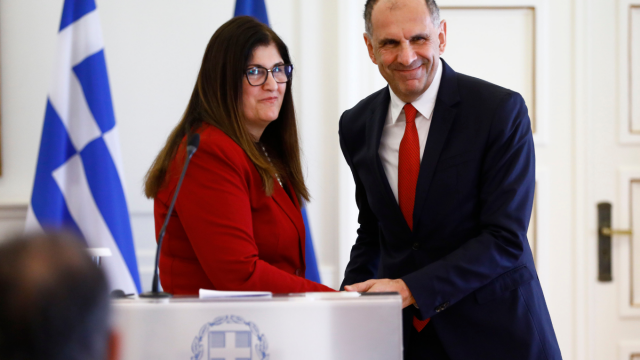Foreign Minister Giorgos Gerapetritis held a significant meeting with his Palestinian counterpart Varsen Aghabekian Sahin in Athens, where for the first time it was officially stated that Greece is closer to recognizing the Palestinian state. This diplomatic move comes after achieving a fragile ceasefire in Gaza and the beginning of the first phase of the hostage return agreement.
Palestine: the new era of “Pax Trumpiana” and its challenges
The period characterized as “Pax Trumpiana” by the international press marked a radical change in the functioning of traditional diplomacy. Donald Trump, by pressuring Benjamin Netanyahu, managed to achieve the ceasefire agreement that everyone desired.
However, no one can characterize the situation as genuine peace. This is a fragile ceasefire that represents the necessary first step toward a long-term solution. Its maintenance depends on numerous factors that make the geopolitical environment fluid and dangerously volatile.
Greece’s strategic position on the Palestinian issue
Within this complex environment, Greece cannot remain a passive observer. The country’s participation in diplomatic efforts to find a viable solution to the Palestinian issue is now considered imperative for multiple reasons:
• Geographic proximity and strategic importance of the region
• Political and humanitarian reasons demanding action
• Historical ties between the Greek and Palestinian peoples
• Need to counterbalance Turkish influence in the region
As a strategic partner of Israel, Greece attempts to maintain balance in an extremely difficult diplomatic environment. Simultaneously, due to deep historical ties with Palestine, it cannot ignore the drama and anguish of Palestinians regarding their future.
The Gerapetritis meeting with the Palestinian minister
The meeting between Gerapetritis and his Palestinian counterpart took place the day after the “Peace Summit” organized by Trump with Egyptian President Al-Sisi. According to diplomatic sources, the meeting had been in preparation for some time, with the Palestinian minister herself requesting to visit our country.
The choice of Greece was not random, as the Palestinian side recognizes that our country has a strong voice both in the European Union and the United Nations. During the meeting, Gerapetritis made the significant statement that “Greece is already one step closer to its declared position on recognizing the state of Palestine.” This was the first time a Greek Foreign Minister made such a clear reference to the recognition issue.
Prerequisites and timeline for recognition
Despite Gerapetritis’ optimistic statement, actual recognition of the Palestinian state by Greece is not expected in the immediate future. According to Athens’ official position, recognition will take place provided that the political process begins. When Greek officials refer to “political consultations,” they mean restarting dialogue between Palestinian and Israeli sides, as well as between Hamas and Fatah.
The Palestinian minister, during her stay in Athens, emphasized the necessity of conducting elections for a unified authority to emerge that would assume governance. However, as she noted, the main obstacle remains Israel’s refusal to allow this process.
The role of Greece and Cyprus in Gaza’s future
The Palestinian minister asked Gerapetritis for Greece’s participation in future discussions on the Middle Eastern issue. This proposal coincides with our country’s aspirations, which as a strategic partner of the US, Egypt, and Israel, and as a non-permanent member of the UN Security Council, claims an active role.
The presence of Greece and Cyprus at Egypt’s Summit was not only due to their geographic proximity to the conflict zone, but also to their claim for a role in Gaza’s next day. Despite Tayyip Erdogan’s objections to Cyprus’ presence, Washington and Cairo recognize that Athens and Nicosia are ready to contribute to Gaza’s future. The ports, ships, and private sectors of both countries, including construction companies, can play a significant role both at humanitarian level and in the region’s reconstruction.
Published in Apogevmatini




